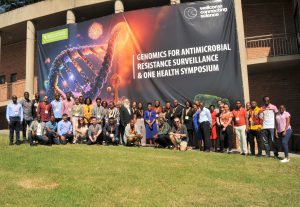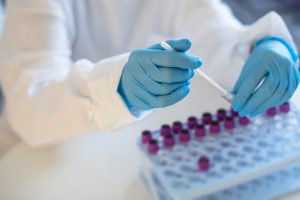The National Institute for Communicable Diseases (NICD), together with research partners Perinatal HIV Research Unit (PHRU), Epicentre, and Genesis Analytics, are currently conducting a survey on Healthcare Utilisation and Seroprevalence of COVID-19 in three districts in South Africa, referred to as the HUTS survey.
The NICD has been monitoring respiratory diseases, such as influenza and pneumococcal disease, in South Africa since 1984. These surveillance systems include pneumonia and influenza-like illness surveillance systems conducted at 15 hospitals and clinics in five different provinces in South Africa. As part of the surveillance, individuals are enrolled and samples are collected to test for pathogens of public health importance, including influenza, respiratory syncytial virus (RSV), and Bordetella pertussis. As of March 2020, the testing of samples for COVID-19 was included. The survey is be conducted in the same districts where the NICD has these long-standing surveillance programmes.
Although these surveillance programmes have provided the NICD with valuable data and allow for the monitoring of trends, they only give a limited view of the complete burden of disease. Surveillance thus far has been limited to situations where the patient has accessed health services, which means those who haven’t visited clinics or hospitals are not included. The confirmation of COVID-19 infection depends PCR or antigen testing, and is usually only performed for those who seek medical assistance as a result of their illness, which is unlikely the case for those who have only experienced mild or no symptoms.
We know from COVID-19 studies in other countries that the majority of infections have been mild with medical care not required, however, the percentage of mild or asymptomatic infections in communities in South Africa is not known. As such, more in-depth research is required to understand how many people have been infected and thereby the community burden of COVID-19. Whilst collecting this data, additional research questions are being addressed, including Knowledge, Attitudes, and Practices (KAP) of COVID-19, and the economic effects that COVID-19 has had on households, as well as healthcare utilisation and costs during the pandemic.
“The COVID-19 pandemic has caused unprecedented suffering throughout the world, including in South Africa. We want to give South Africans the opportunity to share their experiences of COVID-19, and how they have been personally affected. Understanding the specific needs of our own population will help to better inform policy and guidelines. We hope that people will take this opportunity to be part of the response” – Prof Cheryl Cohen, Centre Head of the CRDM, NICD.
The HUTS survey will include:
- A total of 7,200 households will be included in the healthcare utilisation survey, and of these, a total of 2,304 households will also be included in the seroprevalence arm of the survey; data will be collected equally across three provinces, namely, North West, KwaZulu-Natal, and Western Cape.
- Households have been randomly selected to be part of the surveys, and trained field workers from Epicentre will visit the selected households to collect data on general household demographics, COVID-19 KAP, household member screening for respiratory illness, and record of death.
- Within each household, individuals who report having experienced respiratory illness since the start of the COVID-19 pandemic in South Africa will be asked questions about healthcare utilisation and costs related to their illness.
- A selection of households have been randomly chosen to be included in the seroprevalence part of the survey. These households will be visited by field worker teams that have qualified nurses (phlebotomists) who will request to take a blood sample from each individual in the household to test for COVID-19 antibodies, which indicate whether a person has had COVID-19 previously. Individuals who agree to take part in the study will have the opportunity to receive their test results. Individuals will also be requested to provide a sample to be tested for HIV; and household members will also be offered the opportunity for HIV testing on-site, or a referral to a local testing centre.
The survey has been designed to collect similar information to other surveys being conducted, both in South Africa and globally. It is vitally important to understand how the COVID-19 pandemic is affecting the lives of the people of South Africa, and to not only rely on international data to drive decisions made for South Africa.
“We desperately need better data on SARS-CoV-2 transmission from our context; we cannot keep extrapolating from European and Asian counterparts, when our epidemic clearly has different dynamics. This is a superb team, with tons of experience in infectious disease pandemics, and I look forward to their data enabling more coherent responses to the pandemic” – Prof Francois Venter, Ezintsha
The HUTS research consortium would like to request all the randomly pre-selected households to take this opportunity to participate in this survey. The results of the survey will be crucial in assisting the government in both planning and development of the national response to the COVID-19 epidemic in the country.
About the National Institute for Communicable Diseases (NICD)
The National Institute for Communicable Diseases provides reference microbiology, virology, epidemiology, surveillance and public health research to support the Government’s response to communicable disease threats. The NICD serves as a resource of knowledge and expertise of communicable diseases to the South African Government, Southern African Development Community countries and the African continent. The institution assists in the planning of policies and programmes to support and respond to communicable diseases.
About the Centre for Respiratory Diseases and Meningitis (CRDM)
The CRDM is a resource of surveillance, diagnostics, expertise and research in the field of communicable respiratory diseases and meningitis for South Africa and the African continent. The centre generates data and provides expertise related to respiratory diseases and meningitis of public health importance to the South African National Department of Health, health care providers, regional and international collaborators, The CRDM assist its stakeholders in the planning of public health policies and programmes, and response to respiratory disease and meningitis outbreaks. The Centre is also a source of capacity building and formal training within South Africa and the African region.
About PHRU
PHRU is a research unit of the University of the Witwatersrand and a division of the Wits Health Consortium. PHRU conducts adult, paediatric and adolescent HIV treatment research, HIV prevention research and investigations into tuberculosis and other HIV co-infections. In addition to the numerous pharmaceutical and publicly-funded clinical trials PHRU continues to carry out, the unit also conducts important behavioral and social science research, advocates for research access, and provides needed care to the people of Soweto.
About Genesis Analytics – Health Practice
The Genesis Analytics Health Practice works with their clients to develop solutions aimed at improving the health of populations throughout sub-Saharan Africa. Our region is beset by a range of diseases, both communicable and non-communicable, and has relatively weak health services. Within this context, Genesis provides experts with decades of experience in the design, implementation and evaluation of health programmes. Genesis develops customised solutions to address their clients’ most pressing problems. Their focus areas include strategy development (including theory of change mapping), project design and implementation and research and evaluation (including advanced quantitative and qualitative methods).
About Epicentre
Epicentre was founded in 2001 and is an independent organisation that is committed to creating a positive impact on the health and wellness in South Africa. Epicentre aims to close the gap between unscreened, undiagnosed, and uncontrolled HIV & COVID-19 infections as well as other chronic diseases.
Join the conversation at:
nicd.ac.za
https://twitter.com/nicd_sa
http://www.facebook.com/National-Institute-for-Communicable-Diseases-243556293124846/
For more information or to set up interviews, please contact:
Nicole Wolter
Email: nicolew@nicd.ac.za
Cheryl Cohen
Email: cherylc@nicd.ac.za





